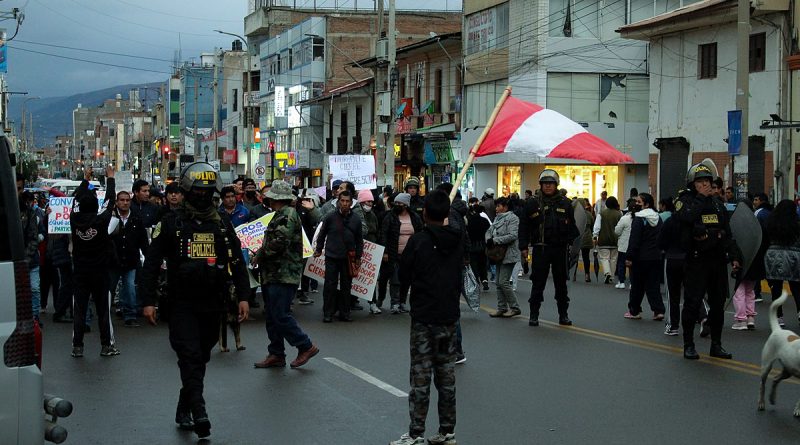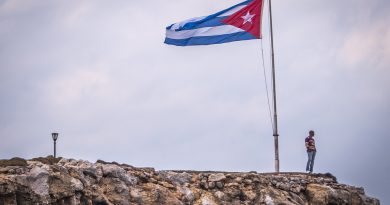Protests Surge in Peru Amid Government Crack Down
Jimmy Murray
Staff Writer
On January 30, twenty members of the U.S. Congress sent a letter to President Joe Biden pleading for him to halt all security assistance toward Peru. The group of mostly progressive Democrats demands that the Biden administration publicly condemn the immense number of human rights and due process violations that are being conducted by the Peruvian government on protestors within the densely populated areas of Peru. The letter calls for the administration to resume funding only when it can confirm that the repression of protestors by the government has ceased, reports NBC News. The reaction to the Peruvian government’s actions comes after the death toll during the protests has risen to over fifty and various due process and civil liberties violations have been committed by the government. The Democrats who have signed the letter are primarily Hispanic progressives including Representatives Alexandria Ocasio-Cortez, Jesús “Chuy” Garcia, Raúl Grijalva, and several more.
Democrats in the U.S. Congress recognized that some of the protestors have contributed to the violence, yet added that most of the violent acts have been committed by Peruvian authorities. As many as fifty-eight people have died since the protests began, with more than forty of them being protestors, reports The Washington Post. The violence continues to surge in Lima and several other populated areas, with protestors recently burning down a police precinct and setting an officer ablaze. According to Reuters, in early January, the protest’s deadliest day concluded with seventeen protestors killed according to the Office of Human Rights of Peru.
The unrest and violent sequence of events have been going strong for months now, beginning on December 7, when former president Pedro Castillo was swiftly ousted by Congress. This came after Castillo attempted what experts have called a “self-coup,” dissolving the legislature in fear of a third impeachment being finally successful against him, according to Foreign Policy. Members of Congress resigned en masse, denouncing Castillo’s dissolution of Congress and accusing the president of corruption. Castillo was quickly arrested by authorities and is now awaiting trial. Castillo’s supporters immediately erupted in an uproar, taking to the streets to protest the president’s arrest and removal from power. Peru has a history of Congress making politically motivated removals of presidents, so in context, recent events have spiraled out of control. It is especially significant considering the large, mainly rural, indigenous, populist movement that was long marginalized in Peru and which largely backed Castillo.
Because Castillo is now being detained and awaiting trial, Vice President Dina Boluarte has been appointed to the executive office. As acting president, Boluarte has already made decisions that have fueled the violent unrest on the streets of Peru. Boluarte immediately restricted civil liberties, including freedom of assembly. She further mobilized the military and riot squads, allowing them to forcefully coerce the protestors with violence. To try to soften the situation and ease tensions, Boluarte has appealed to congress in attempts to push for early elections in 2024, hoping that protestors would see this as an effort to solve the political crisis. Congress has repeatedly voted against moving up the elections, leading Boluarte to threaten to “propose a constitutional reform so that a first round of elections would be held in October and a runoff in December” reports The Guardian.
The political polarization in Peru runs deeper than just the removal of Castillo, however. According to Foreign Policy, “a hemispheric public opinion survey run by Vanderbilt University, Peru had both the highest level of perceived political corruption, with 88 percent of Peruvians believing that ‘more than half’ of politicians are crooked, and the second-lowest level of ‘satisfaction’ with democracy in the region.” Historically, Peru’s constitution makes it especially hard for the executive and congress to get anything done together, according to PBS Newshour.
A large demographic of protestors is of the nation’s indigenous people, who have felt excluded and discriminated against for decades. The rural indigenous population has especially felt the lasting effects of a weakened economy, widespread poverty, and violence. A report by Human Rights Watch shows that since Peru gained independence in 1821, it has been plagued by extreme economic inequality and systemic racism against indigenous populations in rural areas. Since these areas are most likely to experience poverty and make up a small portion of the total population, most of whom reside in big cities such as Lima, voices like Castillo’s were important to those who had felt forgotten by Peruvian society for decades.
Image courtesy of Giancarlo Granza, Wikimedia Commons


